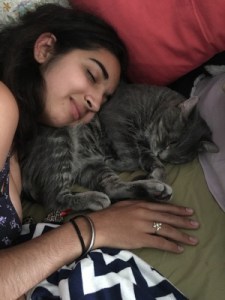A Perfect Match
As a romance writer I’m always thinking about who might fall in love with whom. I’m essentially a matchmaker for the fictional people who live in my head. If I get a new occupant, I immediately have to find a match for them, the question is, what makes two people a good match?
My daughter was recently looking for a good match for herself – not of a romantic kind, but that of an animal companion. She wanted a cat. She knew exactly what sort of cat she wanted. He had to be friendly, love attention and not be frightened of new people.
We met a few cats in various locations (different foster homes and animal shelters). Some were so shy they wouldn’t come anywhere near her. Some allowed her to pet them for a few minutes, but then grew bored and wandered away. Orion and she seemed to fall in love with the first scratch of her fingers on his head. I see a long and happy relationship forming already, and they’ve only known each other a few hours.
Can pairing up two people be as easy? Sometimes it is—there is the trope of two people seeing each other across a room and knowing right away that the other is The One. It works well and has been used frequently.
But in a novel and things can’t work out as easily as my daughter’s immediate love for her new cat. Things need to go wrong. Something needs to get in the way of the new relationship.
Usually, when it’s a story that uses the aforementioned trope, the conflict comes from some outside force. Like in Romeo and Juliet, families and society have a way of getting in between even the most heartfelt lovers.
But what if the hero and heroine are just very different people?
I recently finished reading a Cinderella story where the hero is a duke and the heroine a bar maid. Any Duchess Will Do, by Tessa Dare is a beautiful story of two very different people realizing that no matter where you’re from people are people and can connect on a very fundamental level. There was even one point in the book where the heroine points out that there are thirty-three ranks of precedence between her and the hero, and even goes so far as to begin to list them.
 Personally, I know that it truly makes no difference where someone is from when it comes to matters of the heart. What’s important are your values. My husband was born and raised in India. He could hardly be any more different from me in cultural background and religion. But we have the same values. We connect on so many different levels. We think alike and understand each other, and have from the moment we met. Our early relationship was one of amazement at not how different we were, but how much we were alike.
Personally, I know that it truly makes no difference where someone is from when it comes to matters of the heart. What’s important are your values. My husband was born and raised in India. He could hardly be any more different from me in cultural background and religion. But we have the same values. We connect on so many different levels. We think alike and understand each other, and have from the moment we met. Our early relationship was one of amazement at not how different we were, but how much we were alike.
Tessa Dare does exactly that in Any Duchess Will Do. Despite the fact that the hero and heroine are from such different backgrounds, the story is a discovery of how much, they are actually very much alike; how well they understand each other.
The conflict in their relationship is an internal one as they discover their similarities—because they don’t expect them, instead of the external conflict that keeps people apart in the “eyes meeting across the room” trope.
I’m thrilled that my daughter found exactly the companion she was looking for and I know that they’re going to have many happy years together—hopefully, the cat’s lifetime.
I know that I found—miraculously from across many seas—exactly the right match for me (we celebrate 25 years of marriage this coming year).
And I love finding just the right match for each and every one of the characters who dwell in my imagination, discovering why they should be together and what is keeping them apart that they must overcome in order to find the true reason why they are a perfect match.



